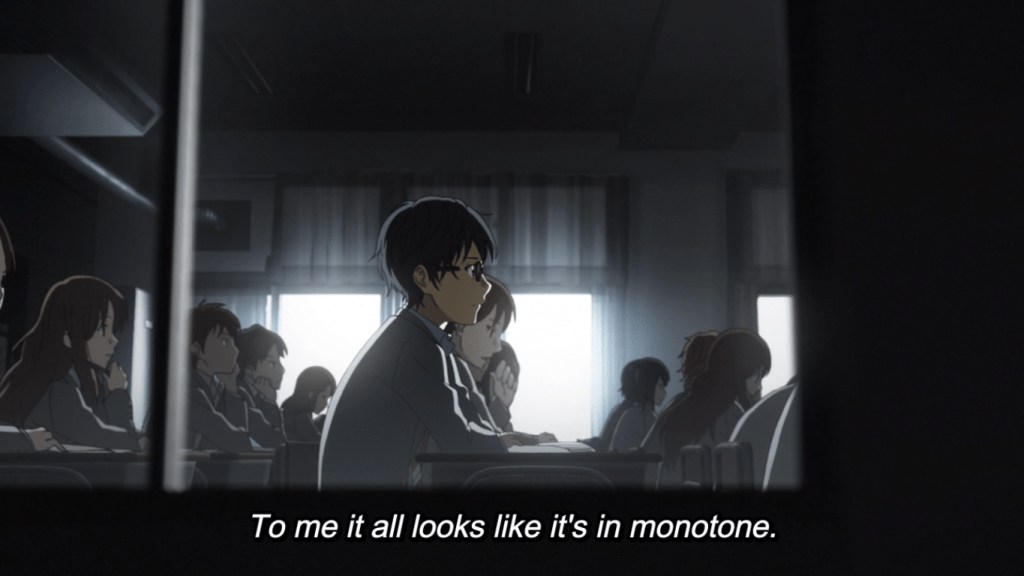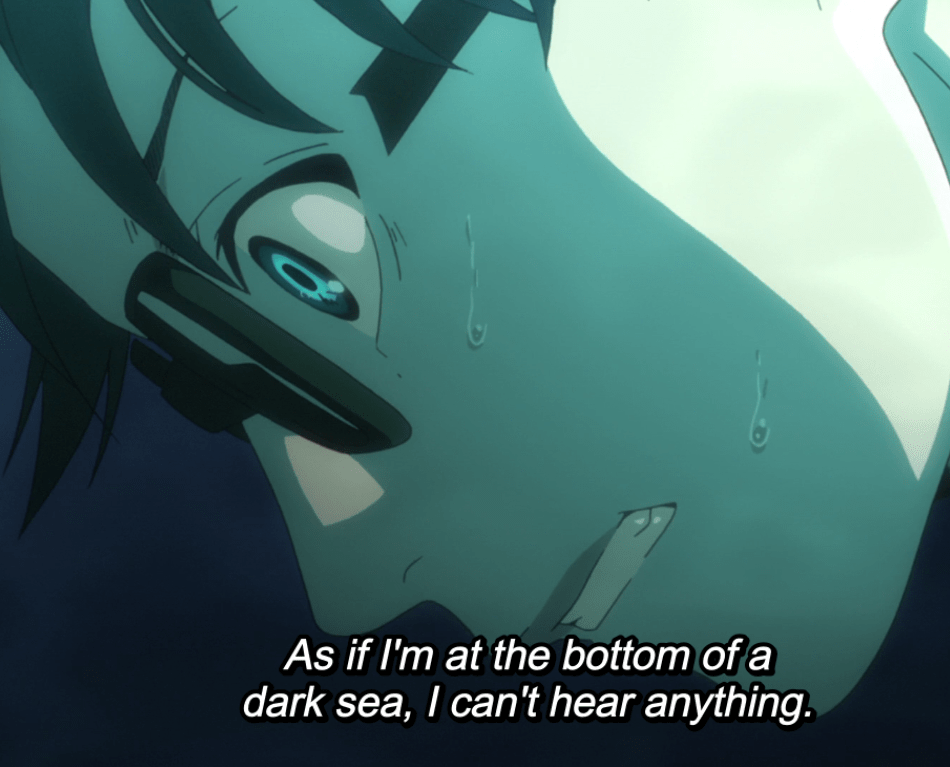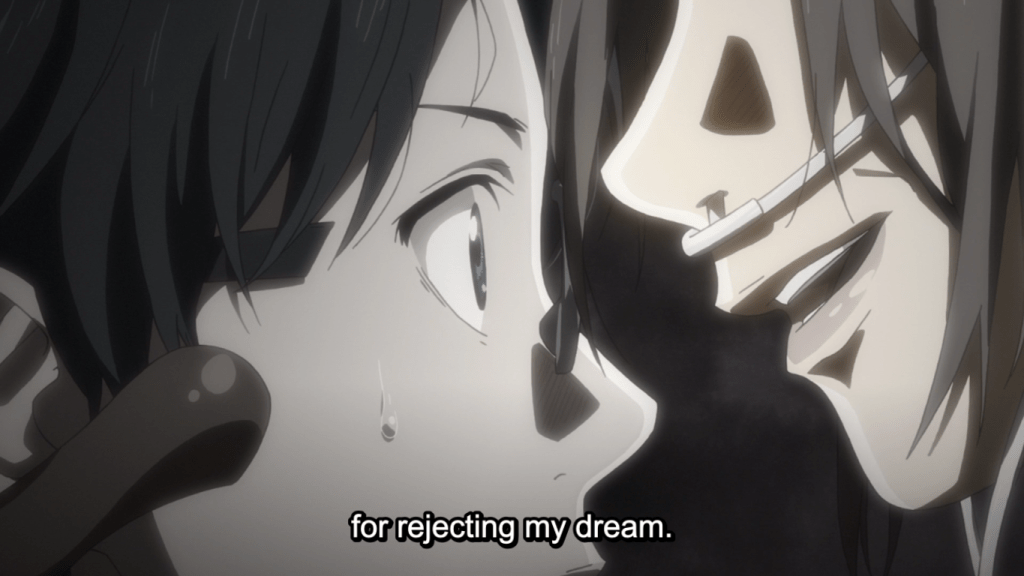
Hey everyone, it’s Kern here. Today I’m reviewing a drama anime, before I do though we should define the difference between drama and melodrama.
Drama is a noun. In the context of this review it means to express an exciting, emotional, or unexpected series of events or set of circumstances. Melodrama is also a noun, but it means to sensationalize a dramatic piece with exaggerated characters and exciting events intended to appeal to the emotions. Sensational means over the top in this instance, but unless you’re Penny Polendina from “RWBY” sensational doesn’t always mean its good.
Actually, I’d argue that most bad drama anime are accidentally melodramas by their nature. Good melodrama is even more difficult to write than drama itself. For example Oniisama e, also known as Dear Brother is a melodrama anime done right.
Unfortunately, crappy drama anime are dime a dozen, melodramaticin all the wrong ways to a fault, and searching for cheap ways to pander to the viewers because that’s the easy thing to do. We’ve all seen them out there.
Every year more mindless drivel gets released only to be forgotten. To be honest, good drama anime are very difficult to come by. That’s why Your Lie in April is an important anime to discuss.
It isn’t a melodrama by its core nature, and it isn’t particularly bombastic either. At the end of the day, Your Lie in April is very well written drama anime.

Your Lie in April or Shigatsu wa Kimi no Uso, released in 2014. It was directed by Kyōhei Ishiguro and written by Takao Yoshioka. The studio that worked on this dramatic title was A-1 Pictures, so you know going in that the music is going to be amazing and the animation quality isn’t going to flounder under its own weight.
There is plenty of media for this series, including manga and a light novel, as well as an OVA. I’ll just be focusing on the anime though.
For me personally, it wasn’t the hardcore gut-punch that many claimed it to be. That being said, it shouldn’t be overlooked or bypassed. To even think otherwise would just be flat out stupid, because there are so many things this anime gets right.
A Simple Story Done Right

Your Lie in April isn’t about complicated interwoven narratives. It can’t carry the same sort of gravitas that some other great anime can. It doesn’t need to do that, and it doesn’t attempt to be more than it is. I can really respect series that understands the core messages and themes it conveys.
Let’s be honest, painting a narrative that encapsulates themes of traumatic experience and coming of age concisely and consistently isn’t always easy. These are teenage characters, but Your Lie in April manages to handle the story incredibly well.
It’s a simple story filled with complicated emotions. It isn’t anything more than that, and it doesn’t want to be. Therefore, what we have instead is a true series of heartfelt emotional turmoil, and the process of overcoming it.
We follow a boy by the name of Arima Kōsei, who is as troubled as could be. After his mother’s death, he lost his love and passion for the piano. He can’t even listen to the sound of his own playing without being bogged down by the emotional weight of it all. Suffering a mental breakdown at a young age, two years later he still struggles with his trauma.
At the beginning of the anime, about halfway into the episode Arima describes how he experiences the world. To him it is a place full of monotone. The vibrancy and thrill of life itself is something he just can see for himself anymore. This is a metaphor for a slew of deeper issues, but on a surface level saying he’s chronically depressed isn’t an understatement.

The catalyst for his emotional levity comes in the form of a young blond haired girl named Kaori Miyazono. She is a skilled violinist with a free spirited personality and a passion and flair for music arts.
Kaori lacks a fair amount of restraint, and Arima observes she has a bit of a violent personality at times. Regardless of that, he’s very interested in her. Kaori’s musical talents and her outlook on life are the influences he needs the most. She lacks his stringent views of the musical arts and she fills a void in Arima’s creative ability.
Slowly and with no small amount of effort, Kaori revitalizes Arima’s love of music. Through her, he begins to see music as an outlet he needs. Slowly, the world becomes a vibrant place for emotional and personal growth once more.

See what I mean? Your Lie in April has a simple and uncomplicated plot. As you can probably guess, this means the anime needs to dig deep to be fully enjoyed. The plot is an emotional journey of the soul itself, a story of triumph over trauma… or in some cases, acceptance over grief.
It’s not groundbreaking by any means, and I’d hesitate to call the series foundational to the anime medium, because it isn’t those things. That being said, the anime is a beautifully told story. Concepts of love and the desire for hope are focal points for the characters. It is what drives the plot forward.
Familial love, romantic love, a passion for hobbies and interests, and a love for life itself trickles into the narrative commonly enough. Hope for the future is what blend the ideologies of these youths together.
Love in spite of trauma and hardship. Love in spite of grief, and love clung onto tightly even when letting go of the past, are all themes well represented here.

Hope and inspiration are the balm for Arima’s traumatic past and his emotional burdens. The healing powers of music plays a strong role here as well. Showcasing that for some people, music is not only a talent, it’s a legacy.
There is also a thick layer of metaphor here, as music is used as a way to connect these characters. It gives us a deeper clarity to who these people really are. Rather than having a character simply go on long and cumbersome diatribes, music becomes the looking glass that allows us to really see beyond their carefully constructed masks.
To be clear, every character has one one these masks, the “lie” you could say. Even the free spirited Kaori is not exempt from this. She has once too, and it is just as tragic and cumbersome as Arima’s own.
The cast is huge. Since the anime is only twenty-two episodes in length, many don’t get the time they deserve. This isn’t too awful though, as the series was never meant to hold aloft a complete medley cast of characters.

At the end of the day only two characters really matter, Arima and Kaori. Everyone else just functions as plot threads to build the world these characters inhabit. Many of the side cast don’t get fully completed stories, and since the plot is so centrally focused anyway, it doesn’t rightly matter.
However for all of the good things this series does manage to do well, there’s just one way it entirely fails in every way possible.
Repetitive Trauma: Eventual Desensitization
Trauma is not a one-size-fits-all narrative lens. After an emotionally crippling experience, recovery has highs and lows. Recovery isn’t easily attained, meaning cycles of repetition can occur. Even though it is very factual to life, generally speaking it isn’t very satisfying to watch.
The cycle of trauma is a vicious one. When poorly handled, it can come off as overbearing. As fans, we usually expect better of protagonists by default and that doesn’t help. We want to hear stories of victory, but in some ways this is a story about loosing more than winning.
By its pure definition, trauma is a deeply distressing or disturbing experience. That means it sinks into a person with a vice-like grip. You don’t just get over it. That’s not how deeply seeded trauma works.
There is a “two-steps-forward and one-step-back” mindset that hard hitting emotional trauma causes. Recovery itself isn’t a linear path. Enter in Arima to that cycle of repetition, and we can see where this causes the main issue I have with Your Lie in April.

Arima is incredibly human for his depiction of circular patterns of thinking. He has a tenancy of falling back down into his own poor mental state.
Several times in the show we see how this impacts him emotionally. There is no question about how heavily it weighs down upon his poor self-image. We can’t avoid the topic, the anime won’t let you.
Although, to a point touching upon his trauma happens too frequently. It’s easy to get bored with him or to lose any ounce of sympathy you have with him. A huge part of that comes down to his constant inner monologues.
His struggles would negatively impact anyone, but especially a boy like him. We don’t need that point beaten into us, yet it often is.
While many characters use music to truly express themselves, there are times the thick and heavy mental state of the characters does that job too. Particularly where Arima is concerned, it can be too much.
I praised the show’s ability to use music as a means of emotional expression and metaphor. That’s because when those moments don’t happen, we get the exact opposite.

Sometimes it seems like the series thinks it needs to beat the point of his anxieties into us, because we’re too stupid to figure it out on our own.
When inner monologues do happen, they’re long and almost too heavy handed. Sometimes it detracts from the musical piece on stage to have the monologue laying so thickly over the top of it. This isn’t a psychology or sociology anime. In the attempt to make Arima feel more like part of humanity, what we have instead is a loss of that human nature itself.
In a way, that’s almost genius. No, I’m not kidding. Listen, it doesn’t matter if we want to admit this or not. It is pure fact. Arima is the personification of what trauma does to a person when left untreated. He should have gotten the help he needed long ago, but he didn’t and what we see is that result. Trauma harms his way of thinking in different ways, damaging the greater logic he needs in order to see his own self-worth.
As much as it sucks to realize this, that holds true to reality. This is why so many people just don’t recover from emotional strain in real life. Even when they think they are on the road to recovery, they can be proven wrong, and it can resurface or come back with a vengeance.
Across several episodes, Arima describes playing the piano as if being under water. The sound dulled, or at times he’s down so deep he can’t hear it at all. While these moments showcase his true anxieties well, it comes so often that it can feel like you’re watching versions of the same scene over and over again.

The issue is though, real life trauma and creative narrative stories don’t always mix very well. This isn’t a true story. These are characters and this is an anime. We need to be able to see the humanity in the characters too, not just the mental struggles they present to the story.
Your Lie in April is not anything like Anohana, that’s for damn sure. This is why it lacks the emotional gut-punch for me. We lose the character Arima to his own brain more times than not. Their mental diatribes lack parts of the core human experience. Notably, it and quite sadly, it lacks any real catharsis.
It gets to a point where I just don’t care about Arima, because I feel like he’s a character better suited to far more heavy handed series. Your Lie in April isn’t by its nature a dark series. It’s emotional, sure, but it’s not dark and gritty.
There’s too much poorly placed comedy to really draw me into a darker narrative. The over all tone of this series doesn’t suit a darker narrative anyway. tragic storytelling is not the same as dark storytelling.
All-in-all this is the largest issue in the series and for some it could even be a deal breaker. I know several people who dropped the show because of Arima alone midway through.
Honestly, that’s a real shame because Kaori’s story is just so damn good in the second half to a point she nearly steals the show, and for good reason.

Speaking of Kaori, by now you’re probably wondering why I am avoiding saying too much about her. Well, I wish I could say more on that, but I won’t.
No, really, I can’t dive into that, because it is way too fundamental to the story to speak at length about it. I don’t want to spoil her story arc for those who haven’t seen the series. I want you to watch it and see it for yourself.
What I will say is that Kaori is the reason you watch this anime. Her message, her emotional traumas, and her bond with Arima aren’t things you just pass up. All of it is just just too good, and it will kick your ass emotionally more than Arima alone ever could.
It also finally gives Arima the catharsis he’s needed for the vast majority of the twenty-two episode run time. So yeah, sorry, can’t spoil it. You’ve got to experience it for yourself.
Final Thoughts
Yes, there are many flaws with this show. Even so, it doesn’t diminish that Your Lie in April is one of the best drama anime out there. While it doesn’t usually portray as melodramatic, it can toe the line sometimes.

The series is also possibly one of the best examples of how real trauma manifests in a person. The series explains why it is not so easy to move beyond it. The show fully displays those difficulties even when its a hindrance to do so.
That legitimate “two-steps-forward and one-step-back” traumatic cycling is very hard to find in any anime series. Usually it just isn’t done well. Normally it has some supernatural or magical component to it… or there are time skips clogging the recovery itself.
Your Lie in April offers that distinct personal looking glass of that trauma inwardly. On top of that, it manages to do it in a fairly digestible way. Completely accessible for teenage viewers and with a core theme that suits reality. Often times people in mental health recovery programs take up the arts as form of healthy outlet. Arima’s coping skills through music are very reminiscent of that, even though music is part of his trauma in the first place.
It’s a messy message to send, I won’t deny that. However that alone holds true too. Trauma will never be clear cut, and it would be impossible to avoid the triggers that cause trauma for your entire life. Learning to move above and beyond that will never be simple. One day, you need to find the way to cope with it, or you’ll just continue to suffer.
Arima learns that the hard way, but it is a lesson we all come to learn in our lives at some point.

Kaori’s involvement in his life, and his newfound love of music isn’t a cure-all, and that’s the key. Thanks to Kaori’s influence and using music as a touchstone, Arima finds a way to deal with his traumatic life experiences in a helpful and meaningful way.
Now, are there better depictions of this sort of theme out there? Sure there is! However, all of those better examples I come up with aren’t as easily accessible to viewers, or they’re filled with concepts just aren’t useful for younger teenagers.
Your Lie in April doesn’t shy away from emotional difficulties, but I’d never say the anime goes too far down the rabbit-hole either. It can be heavy handed, but I wouldn’t call it nightmare fuel by any means.
This strong balance makes it one of the best drama anime out there that focuses on traumatic life experience. If that sort of thing interests you, then you have to watch this anime and come up with your own opinions. There’s no question about that.
This has been Kernook of “The Demented Ferrets”, where stupidity is at its finest, and level grinds are par for the course. If you liked this review please be sure to check out similar content down below, plus a few announcements of upcoming anime review content.
We have a lot of great review content coming up in the following weeks. The Patreon exclusive poll has some results in for one game review and one anime review. If you want to help decide content going forward, becoming a patron is your way to do that.
Anime: Zombie Land Saga in the first week of June.
Game: Valkyria Chronicles for the PlayStation 3 also in the first week of June.
To Our Supporters: Thank You!
With your contributions, you make our efforts possible. Thank you for supporting our content. Patreon supporters receive access into our official Discord server, and a few other perks depending on the tier.
There is a $1 tier, perfect for blog readers, so don’t hesitate. Join today!
Patreon Supporters
At the time of this post there are 3 supporters of our content, currently all of them are in the “Demented Minion” tier.
($1) Little Ferrets: None
($3) Fandom Ferret: None
($5) Demented Minions: Francis Murphy, Josh Sayer, and Andrew Wheal.
($10) True Blue Ferret: None.
($25) Premium Ferret: None.
($50) Round Table Ferret: None.


[…] Static Speaks My Name – [Game]Uniracers: Bombastic Fun [Game]Void Bastards – [Game]Your Lie in April – [Anime]Zombie Land Saga (Season 1) – […]
LikeLike
[…] anime that might come close in terms of impact might be Your Lie in April, but that anime has nothing on this story, at least in my eyes. Sure, March Comes in Like a Lion […]
LikeLike
[…] Static Speaks My Name – [Game]Uniracers: Bombastic Fun [Game]Void Bastards – [Game]Your Lie in April – [Anime]Zombie Land Saga (Season 1) – […]
LikeLike
[…] a snippet of The Demented Ferrets‘ review on Your Lie in […]
LikeLike